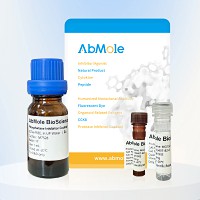
Species: Human
Expression system: Mammalian
Purity: > 95% as determined by reduced SDS-PAGE
Endotoxin: less than 0.1 ng/µg (1 EU/µg) by LAL test
Apparent molecular weight: 60-90 kDa, reduction conditions
Storage and stability: Storage temperature ≤-70℃, stable storage for 6 months after receiving goods. After opening, store in aseptic condition for 3 months, storage temperature ≤-70℃. Please minimize freeze-thaw cycles.
Bioactivity: Lysosomal Pro-X carboxypeptidase (PRCP) belongs to peptidase S28 family. PRCP has been detected in many tissues, with the highest levels in placenta, lung, and liver. It is also found in the heart, brain, pancreas and kidneys. PRCP exists as a homodimer. PRCP cleats C-terminal amino acids linked to proline in peptides such as angiotensin II, III, and DES-Arg9-bradykinin. This cleavage occurs at acidic pH, but some substrates remain enzymatic active at neutral pH. PRCP has been shown to be an activator of cell-matrix associated prekallikrein.
| Storage |
Powder -20°C 3 years ; 4°C 2 years In solvent -80°C 6 months ; -20°C 1 month |
| Species | Mouse | Rat | Rabbit | Guinea pig | Hamster | Dog |
| Weight (kg) | 0.02 | 0.15 | 1.8 | 0.4 | 0.08 | 10 |
| Body Surface Area (m2) | 0.007 | 0.025 | 0.15 | 0.05 | 0.02 | 0.5 |
| Km factor | 3 | 6 | 12 | 8 | 5 | 20 |
| Animal A (mg/kg) = Animal B (mg/kg) multiplied by | Animal B Km |
| Animal A Km |
For example, to modify the dose of Compound A used for a mouse (20 mg/kg) to a dose based on the BSA for a rat, multiply 20 mg/kg by the Km factor for a mouse and then divide by the Km factor for a rat. This calculation results in a rat equivalent dose for Compound A of 10 mg/kg.
| Related Recombinant Proteins Products |
|---|
| Recombinant Human Serpin A12 (E.coli, N-GST)
Vaspin (Visceral Adipose-Specific SERPIN) is a newly described adipokine. Vaspin is also a unique insulin sensitizing adipocytokine in obesity. |
| Recombinant Human B2M Protein (Mammalian, C-6His)
β-2-Microglobulin (B2M) is a secreted protein with 1 Ig-like C1-type (immunoglobulin-like) domain which belongs to the beta-2-microglobulin family. B2M may adopt the fibrillar configuration of amyloid in certain pathologic states. |
| Recombinant Mouse E-Selectin/CD62E Protein (HEK293)
E-selectin, also known as endothelial leukocyte adhesion molecule-1 (ELAM-1) and CD62E, is an inducible adhesion molecule that is expressed on the surfaces of stimulated vascular endothelial cells and is sometimes involved in cancer cell metastasis. |
| Recombinant Human DPP4/CD26 (Mammalian, C-6His)
DPP4/CD26 is a signal-anchor for type II membrane protein that belongs to the peptidase S9B family. DPP4/CD26 acts as a positive regulator of T-cell coactivation, by binding at least ADA, CAV1, IGF2R, and PTPRC. It’s binding to CAV1 and CARD11 induces T-cell proliferation and NF-kappa-B activation in a T-cell receptor/CD3-dependent manner. |
| Recombinant Human USP14 (E.coli, N-6His)
USP14 belongs to the ubiquitin-specific processing (USP) family which is a deubiquitinating enzyme (DUB) with His and Cys domains. USP14 acts also as a physiological inhibitor of endoplasmic reticulum-associated degradation (ERAD) under the non-stressed condition by inhibiting the degradation of unfolded endoplasmic reticulum proteins via interaction with ERN1. |


Products are for research use only. Not for human use. We do not sell to patients.
© Copyright 2010-2023 AbMole BioScience. All Rights Reserved.
